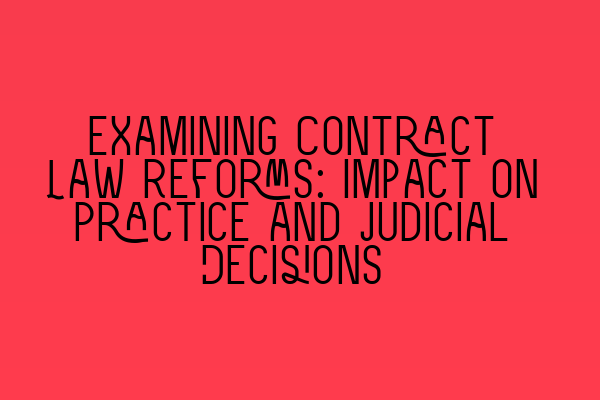Examining Contract Law Reforms: Impact on Practice and Judicial Decisions
Welcome to the SQE Contract Law blog, where we delve deep into the world of contract law and provide insights into the latest legal developments. In this article, we will be examining the impact of contract law reforms on legal practice and judicial decisions. So, grab a cup of coffee and join us as we explore this fascinating topic.
Contract law is the backbone of commercial transactions and legal agreements. It governs the rights and obligations of parties entering into a contract and provides a framework for resolving disputes. Over the years, contract law has evolved and adapted to meet the changing needs of society, business, and technology.
One of the significant influences on contract law is the ongoing reforms and legislative changes. These reforms aim to enhance efficiency, clarity, and fairness in contract formation, interpretation, and enforcement. As legal practitioners, it is crucial to understand how these reforms impact our daily practice and shape judicial decisions.
Let’s begin by examining some key contract law reforms that have recently come into effect. These reforms include:
1. Statutory Interpretation: Recent reforms have sought to clarify the process of interpreting statutes and contractual terms. This has led to a more robust and systematic approach in determining the intention of the parties and resolving ambiguities. Such reforms have enabled courts to make more consistent and predictable decisions, promoting uniformity in contract law.
2. Good Faith: The principle of good faith has gained prominence in contract law reforms. Parties are now required to act honestly and reasonably, and not to undermine the fundamental purpose of the contract. This has introduced a higher level of moral obligation and fairness in contractual dealings, offering protection to parties who may be at a disadvantage.
3. Unfair Contract Terms: Legislation has been enacted to protect consumers and small businesses from unfair contract terms. The reforms have introduced a test of fairness, where courts can scrutinize and strike down unfair and unreasonable terms that create significant imbalances between parties. This ensures that contracts are more balanced and equitable, safeguarding the interests of vulnerable parties.
4. Digital Contracts: With the increasing prevalence of e-commerce, contract law reforms have addressed the challenges posed by digital contracts. The reforms have clarified the rules regarding the formation, authentication, and enforceability of electronic contracts. This has facilitated the growth of online businesses and provided certainty in electronic transactions.
These contract law reforms have had a profound impact on legal practice and judicial decisions. Firstly, solicitors need to stay up-to-date with the latest legislative changes to ensure compliance and provide accurate legal advice to clients. By understanding the reforms, solicitors can assist clients in drafting contracts that are enforceable and meet the requirements of the law.
Judicial decisions have also been influenced by these reforms. Courts now place greater emphasis on interpreting contracts in a manner that upholds the principles of fairness and reasonableness. The reforms have given judges more tools to evaluate the intentions of the parties and strike a fair balance between their interests. This has led to more equitable outcomes and greater certainty in contract disputes.
To illustrate the practical implications of these reforms, let’s look at real-life case studies. In our previous article, “Unveiling Real-Life Case Studies: Insights into Legal Practice and Decision-Making,” we have provided in-depth analysis and commentary on how contract law reforms have shaped the outcomes of various court cases. These case studies offer valuable insights into the application of contract law in practice.
As solicitors, it is essential to adapt our legal practices to the changing legal landscape. This includes honing our client relationship management skills, as discussed in our article “Mastering Client Relationship Management: Skills for Solicitors to Enhance Trust and Loyalty.” Building trust and maintaining strong relationships with clients are crucial for success in the legal profession.
Additionally, understanding the impact of contract law reforms can help aspiring solicitors navigate their career paths. If you are considering a career in law, our article “Pursuing a Law School Education in the UK: Choosing the Right Path for Your Future” provides valuable insights into the different educational options and career prospects in the legal field.
Finally, for those seeking guidance on securing training contracts and embarking on the journey of becoming a solicitor, our article “Securing Training Contracts: A Roadmap to Becoming a Solicitor” provides a comprehensive roadmap and valuable tips to help you kickstart your legal career.
In conclusion, contract law reforms have significantly influenced legal practice and judicial decisions. These reforms have brought clarity, fairness, and efficiency to contract law, benefiting both solicitors and clients. By staying abreast of the latest reforms and incorporating them into our legal practices, we can provide the best possible legal advice and ensure that justice is served.
Thank you for joining us on this exploration of contract law reforms. We hope you found this article informative and insightful. Stay tuned for more engaging content from SQE Contract Law!
Related Articles:
– Unveiling Real-Life Case Studies: Insights into Legal Practice and Decision-Making
– Exploring Solicitor Salaries in the UK: Average Earnings and Factors Affecting Income
– Mastering Client Relationship Management: Skills for Solicitors to Enhance Trust and Loyalty
– Pursuing a Law School Education in the UK: Choosing the Right Path for Your Future
– Securing Training Contracts: A Roadmap to Becoming a Solicitor
